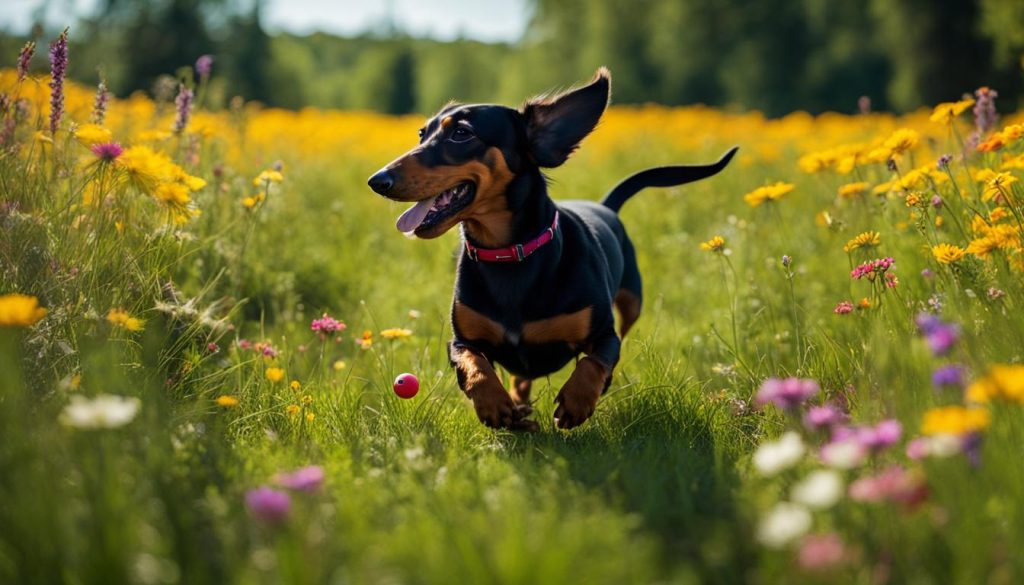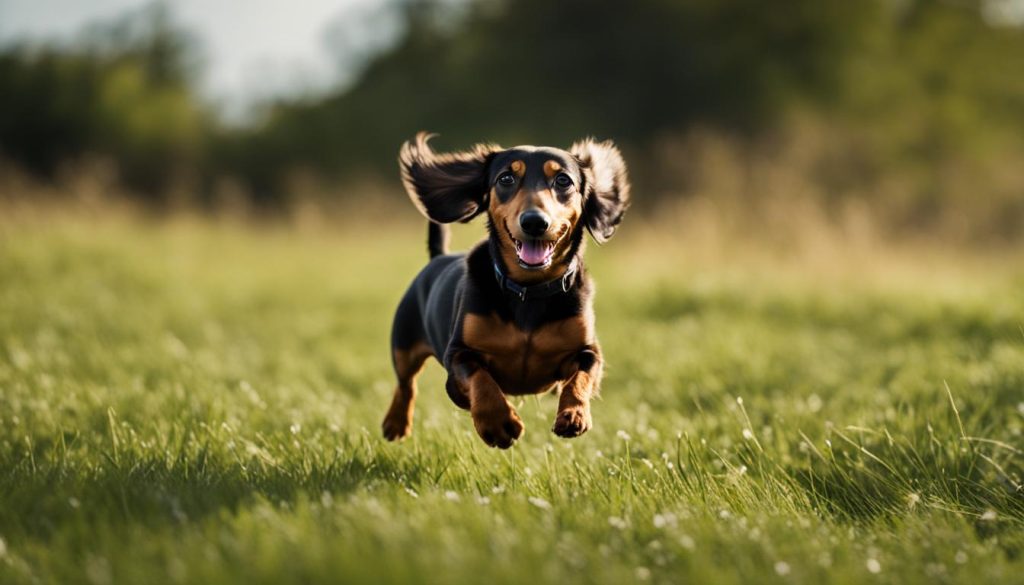Are Dachshunds good family dogs? This is a question many prospective dog owners ask themselves when considering this adorable breed as a family pet. As a professional journalist, I have researched and uncovered the truth about Dachshunds’ suitability as family dogs, their temperament for families, and the many reasons why they make great family pets.
Dachshunds are known for their loyalty, affection, and playful nature. When provided with proper care, attention, and training, they can thrive in a family environment. Their small size and adorable appearance make them an attractive choice for families of all sizes.
One of the significant benefits of owning a Dachshund as a family pet is their compatibility with families. With their friendly and sociable nature, Dachshunds can quickly adapt to the dynamics of a household and form strong bonds with family members, including children. However, it is important to note that Dachshunds may not be suitable for families living in small apartments due to their tendency to bark and dig.
Understanding the characteristics of Dachshunds as family pets is crucial for potential owners. While they are generally good with kids when adequately socialized, their miniature and fragile size makes them sensitive to rough play or handling, making them more suitable for older children. Additionally, Dachshunds’ compatibility with other pets may vary, as some may get along well with other animals, while others may be less tolerant.
To summarize, Dachshunds can indeed be good family dogs, provided they receive the proper care, attention, and training they need. Their loyalty, affection, and compatibility with families make them an excellent choice for those looking for a four-legged companion. However, it is essential to consider their temperament, exercise requirements, diet needs, grooming requirements, and training and socialization needs before bringing a Dachshund into your family.
Key Takeaways:
- Dachshunds can be great family dogs if provided with proper care, attention, and training.
- Their loyalty, affection, and compatibility with families make them an attractive choice.
- Consider their temperament, exercise, diet, grooming, and training needs before getting a Dachshund.
- They may not be suitable for small apartments due to their tendency to bark and dig.
- Their compatibility with children and other pets may vary, requiring proper socialization.
Are Dachshunds Good with Kids?

Dachshunds can be wonderful companions for kids if they are properly supervised and treated with respect. Their miniature and fragile size makes them more vulnerable to rough play or handling, so they may not be ideal for families with very young children. However, with the right training and socialization, Dachshunds can learn to tolerate and enjoy the company of children.
It is important to teach children how to interact with Dachshunds appropriately, such as not pulling their ears or tail, and not engaging in rough play. Dachshunds are generally friendly and affectionate towards children when given the opportunity to form a bond, but it is crucial that interactions are always supervised to prevent any unintentional harm.
Additionally, Dachshunds have a tendency to be protective of their space and belongings, so it is essential to establish boundaries and teach children to respect the dog’s personal space. By providing proper guidance and training to both the dog and the children, a harmonious relationship can be fostered between Dachshunds and kids.
The Benefits of Dachshunds as Family Dogs:
- Dachshunds are loyal and affectionate, making them great companions for children.
- They are small in size, making them suitable for households with limited space.
- Dachshunds can be easily trained and are generally well-behaved around kids.
- They have a playful nature and can provide hours of entertainment for children.
- Dachshunds form strong bonds with their families and are known for their devotion.
| Dachshunds’ Compatibility with Kids | Behavior around Kids |
|---|---|
| Generally good compatibility given proper socialization | Affectionate and playful |
| May not be suitable for families with very young children | Sensitive to rough play or handling |
| Supervision is essential to prevent unintentional harm | Protective of their space and belongings |
Are Dachshunds Good with Other Pets?
Dachshunds’ compatibility with other pets depends on the individual dog. Some dachshunds get along well with other animals, while others may be less tolerant. It’s important to introduce them slowly and under supervision. Some dachshunds can be territorial and may try to guard their food or toys.
When introducing a dachshund to other pets, it’s crucial to provide a controlled environment where interactions can take place. Start by allowing them to sniff each other from a distance, gradually decreasing the distance over time. Supervise their interactions closely and be prepared to intervene if any signs of aggression or discomfort arise.
Proper socialization from a young age can increase the chances of a dachshund getting along with other pets. Early exposure to different animals helps them develop positive associations and reduces the likelihood of fear or aggression later on. Training and positive reinforcement techniques can also help a dachshund understand appropriate behavior around other pets.
Please be aware that dachshunds have a strong prey drive due to their hunting background. Small animals such as rodents or birds may trigger their instinct to chase, so caution should be exercised when introducing them to small pets like hamsters or birds. Always prioritize the safety and well-being of all pets involved.
| Pros | Cons | |
|---|---|---|
| Dachshunds’ compatibility with other pets |
|
|
Pros of Owning a Dachshund

Owning a Dachshund as a family pet comes with numerous benefits and advantages. Their unique characteristics make them a popular choice for many households. Here are some of the pros of having a Dachshund:
1. Loyal and Affectionate:
Dachshunds are known for their unwavering loyalty and affection towards their owners. They form strong bonds and love to be part of the family. Their loving nature makes them excellent companions, providing comfort and emotional support.
2. Easy to Train:
Dachshunds are intelligent and eager to please, which makes them relatively easy to train. With consistent training methods and positive reinforcement, they can quickly learn basic commands and tricks. Their trainability makes them a suitable choice for first-time dog owners.
3. Portable and Travel-Friendly:
One of the advantages of Dachshunds is their size, which makes them highly portable and suitable for families always on the go. Whether it’s a road trip or a family vacation, Dachshunds can easily accompany you, bringing joy and companionship wherever you go.
| Pros of Owning a Dachshund |
|---|
| Loyal and Affectionate |
| Easy to Train |
| Portable and Travel-Friendly |
In summary, owning a Dachshund as a family pet offers numerous advantages. Their loyalty and affection, combined with their trainability and travel-friendly nature, make them a great choice for families seeking a loving and adaptable companion. However, it’s important to consider the specific needs of Dachshunds and ensure they receive proper care, attention, and training for a happy and fulfilling relationship.
Cons of Owning a Dachshund

While there are many advantages to owning a Dachshund, it’s important to consider the potential drawbacks before making the decision to bring one into your family. Here are some challenges that you should be aware of when considering a Dachshund as a family pet:
- Size and Fragility: Dachshunds are small and fragile dogs, especially the miniatures. This means they may be more susceptible to injuries, especially if mishandled or accidentally dropped. It’s important to be gentle and cautious around them, especially if you have young children who may not understand their delicate nature.
- Potential Stubbornness: Dachshunds are known for their independent and sometimes stubborn nature. This can make training a bit more challenging compared to other breeds. You may need to employ consistent and patient training methods to ensure they learn commands and behaviors.
- Health Issues: Dachshunds are prone to specific health issues, including intervertebral disc disease and obesity. Their long, low bodies put them at higher risk for back problems, and they can easily become overweight if their diet and exercise are not properly managed. Regular veterinary check-ups and a balanced diet are crucial for their overall well-being.
- Excessive Barking: Dachshunds are known to be alert barkers and may bark more frequently compared to other breeds. This can be a challenge if you live in an apartment or have close neighbors who may find the noise disruptive. Proper training and socialization from a young age can help minimize excessive barking.
Considering these challenges and weighing them against the positive aspects of owning a Dachshund can help you make an informed decision about whether they are the right fit for your family. With the right care, training, and attention, Dachshunds can bring joy and companionship to your household.
| Pros | Cons |
|---|---|
| Affectionate and loyal | Size and fragility |
| Easy to train | Potential stubbornness |
| Portable and travel-friendly | Health issues |
| Good with kids (with supervision) | Excessive barking |
| Compatible with some other pets |
As you can see from the comparison table above, while there are several advantages to owning a Dachshund, there are also important considerations to keep in mind. Ultimately, the decision to bring a Dachshund into your family should be made after careful thought and research, taking into account the specific needs and dynamics of your household.
Understanding Dachshund Temperaments

Dachshunds have unique personalities and temperaments that make them a beloved breed among dog enthusiasts. Understanding their characteristic traits and behaviors can help you better care for and interact with your Dachshund.
Temperament
- Dachshunds are known for their independent nature. They can be stubborn at times, which means patience and consistent training are essential.
- Despite their small size, Dachshunds have a big personality. They are courageous, alert, and make excellent watchdogs.
- They are also highly intelligent and curious, often displaying a playful and mischievous side.
- Dachshunds form strong bonds with their owners and thrive on companionship and human interaction.
Behavior
- Dachshunds are natural diggers. This behavior stems from their hunting instincts, as they were originally bred to burrow into tunnels and chase prey.
- They can be territorial and protective of their space, which may result in barking or growling at unfamiliar people or animals.
- Socialization is crucial for Dachshunds to ensure they are comfortable around other dogs and new experiences.
- Dachshunds are prone to separation anxiety if left alone for long periods. They crave companionship and may exhibit destructive behaviors when bored or lonely.
It’s important to provide your Dachshund with proper mental and physical stimulation to keep them happy and well-adjusted. Regular exercise, training, and socialization are key elements in managing their temperament and behavior. By understanding their unique traits and meeting their needs, you can foster a loving and harmonious relationship with your Dachshund.
Dachshund Exercise Requirements

Dachshunds are lively and energetic dogs that require regular exercise to stay healthy and happy. Providing them with adequate physical activity is essential for their overall well-being.
Exercise Needs
Dachshunds have moderate exercise needs and should engage in at least 20-40 minutes of physical activity every day. This can consist of brisk walks, playtime in a securely fenced area, or interactive games that stimulate their mind and body. Regular exercise helps to prevent weight gain, keeps their muscles toned, and reduces the risk of boredom-related behaviors like excessive barking or destructive chewing.
Physical Activity Options
There are various ways to keep your Dachshund active and entertained. In addition to daily walks, they enjoy playing fetch, participating in obedience training sessions, or taking part in agility courses. Dachshunds also love exploring new environments and going on hikes. However, it’s important to avoid activities that involve excessive jumping or repetitive strain on their long backs, as this can lead to spinal issues.
| Physical Activities for Dachshunds | Benefit |
|---|---|
| Daily walks | Helps maintain a healthy weight and provides mental stimulation |
| Playtime in a secure area | Allows them to burn off excess energy and bond with their family |
| Interactive games | Provides mental stimulation and helps prevent boredom |
| Obedience training | Keeps their minds engaged and strengthens the bond with their owner |
| Hikes or nature walks | Offers a chance for exploration and new sensory experiences |
Regular exercise helps to prevent weight gain, keeps their muscles toned, and reduces the risk of boredom-related behaviors like excessive barking or destructive chewing.
Remember to tailor the exercise routine to your Dachshund’s age, health condition, and individual preferences. Consulting with a veterinarian can help you determine the appropriate level of physical activity for your furry friend. By providing regular exercise, you can ensure that your Dachshund remains happy, healthy, and well-balanced.
Dachshund Diet Requirements
Feeding your Dachshund a balanced and nutritious diet is crucial for their overall health and well-being. By understanding their nutritional needs and choosing the right food, you can ensure that your Dachshund stays happy and healthy for years to come.
Dachshunds have specific dietary requirements due to their unique body shape and size. They are prone to obesity, which can lead to various health issues, including joint problems and back pain. To prevent this, it’s important to provide them with a diet that is appropriate for their size and activity level.
When choosing food for your Dachshund, look for high-quality dog food that is specifically formulated for small breeds. The food should contain a balance of protein, carbohydrates, and fats, along with essential vitamins and minerals. Avoid feeding them table scraps or human food, as this can lead to weight gain and digestive issues.
Quote: “Feeding your Dachshund a balanced and nutritious diet is crucial for their overall health and well-being.” – Veterinarian Dr. Michelle Smith
| Feeding Guidelines for Dachshunds | Amount | Frequency |
|---|---|---|
| Puppy | 3-4 small meals per day | Up to 6 months old |
| Adult | 1-2 meals per day | Over 6 months old |
| Senior | 1-2 meals per day | Over 7 years old |
In addition to providing a balanced diet, it’s essential to monitor your Dachshund’s weight and adjust their food intake accordingly. Your veterinarian can help you determine the appropriate portion sizes based on your dog’s age, weight, and activity level. It’s also important to provide fresh, clean water at all times to keep your Dachshund hydrated.
By following these guidelines and choosing the right diet for your Dachshund, you can ensure that they maintain a healthy weight and enjoy a long and happy life.
Dachshund Grooming Requirements

Proper grooming is essential for keeping your Dachshund looking and feeling their best. Here are some important aspects of Dachshund grooming:
Dachshunds’ Coat Care
Dachshunds have short, smooth coats that are relatively low maintenance. Regular brushing is necessary to remove loose hair and keep the coat looking shiny. Use a soft bristle brush or a grooming mitt to gently brush your Dachshund’s fur in the direction of hair growth. This helps distribute natural oils and prevent matting.
Brushing Dachshunds’ Fur
Brushing Dachshunds’ fur is not only important for maintaining their coat’s appearance but also helps stimulate the skin and promotes healthy circulation. It’s a great bonding activity that allows you to check for any skin issues, lumps, or abnormalities. Remember to be gentle and patient, as Dachshunds have sensitive skin.
Trimming Dachshunds’ Nails
Regular nail trimming is essential for your Dachshund’s comfort and overall well-being. Dachshunds’ nails can become long and sharp if not properly maintained, which can cause discomfort or even lead to injury. Use a pair of dog nail clippers or a grinder specifically designed for dogs to trim the nails. Be careful to avoid cutting the quick, which is the sensitive part inside the nail.
Bathing Dachshunds
Dachshunds don’t require frequent baths unless they get particularly dirty or develop a strong odor. Aim to bathe your Dachshund every 2-3 months or as needed. Use a mild dog shampoo that is suitable for their sensitive skin and lather it gently into their coat. Take care to rinse thoroughly and dry your Dachshund completely to prevent any skin irritations or infections.
| Grooming Aspect | Frequency |
|---|---|
| Brushing | 2-3 times a week |
| Nail Trimming | Every 2-3 weeks |
| Bathing | Every 2-3 months or as needed |
| Professional Grooming | Every few months for long-haired Dachshunds |
Finding the Right Dachshund
When it comes to finding the right Dachshund for your family, there are a few key factors to consider. First, you’ll want to decide on the size of the Dachshund that best suits your lifestyle. Dachshunds come in standard and miniature sizes, each with its own unique characteristics and needs. Standard Dachshunds are larger and may be better suited for families with older children or more active lifestyles, while miniature Dachshunds are smaller and may be a better fit for smaller living spaces or families with young children.
Once you’ve determined the size, it’s important to consider the temperament of the individual Dachshund. Some Dachshunds may be more outgoing and sociable, while others may be more reserved or independent. It’s a good idea to spend some time with different Dachshunds to get a sense of their personalities and see which one meshes best with your family dynamic.
When choosing a Dachshund puppy, make sure to research reputable breeders or consider adopting from a rescue organization. Look for breeders who prioritize the health and well-being of their dogs, and who are knowledgeable about the breed. It’s important to ask questions about the puppy’s parentage, health history, and any genetic testing that may have been done.
In terms of breed options, the Dachshund comes in three coat varieties: smooth, wirehaired, and longhaired. Each coat type requires different grooming needs, so consider which one best fits your lifestyle and preferences. Smooth-coated Dachshunds are low maintenance, while wirehaired and longhaired Dachshunds require more regular brushing and grooming to keep their coats in good condition.
| Breed Option | Description |
|---|---|
| Smooth-coated Dachshund | Low maintenance, short and sleek coat |
| Wirehaired Dachshund | Harsh, wiry coat that requires regular brushing and hand-stripping |
| Longhaired Dachshund | Silky, long coat that requires regular brushing and occasional professional grooming |
Quotes:
“Choosing the right Dachshund for your family is a decision that requires careful consideration. It’s important to take into account factors such as size, temperament, and grooming needs to ensure a compatible match.” – Dachshund enthusiast
Training and Socializing a Dachshund
Training and socializing a Dachshund are crucial for their overall well-being and the harmonious integration of these dogs into a family. Proper training helps establish boundaries, instill good behavior, and ensure that your Dachshund is a well-mannered companion. Socialization exposes your Dachshund to various people, animals, and environments, reducing the likelihood of fear or aggression.
When it comes to obedience training, consistency and positive reinforcement are key. Start with basic commands like sit, stay, and come. Reward your Dachshund with treats, praise, and affection when they successfully perform the desired behavior. Use clear and concise commands, and be patient as Dachshunds can be stubborn at times. Remember to keep training sessions short and enjoyable to maintain your Dachshund’s interest and focus.
Behavior training is also essential for Dachshunds. Address any problematic behaviors such as excessive barking, digging, or separation anxiety. Consistency, positive reinforcement, and redirection techniques can help modify these behaviors. Seek guidance from professional trainers or behaviorists if needed.
| Training Tips for Dachshunds |
|---|
| 1. Start training early: Begin training and socialization when your Dachshund is a puppy to establish good habits and prevent behavioral issues. |
| 2. Use positive reinforcement: Reward your Dachshund with treats, praise, and playtime for good behavior. Avoid punishment-based training methods. |
| 3. Be patient and consistent: Dachshunds can be stubborn, so patience and consistency are key. Repeat commands and reinforce positive behavior consistently. |
| 4. Socialize regularly: Expose your Dachshund to different people, animals, and environments to build their confidence and reduce fear or aggression. |
| 5. Seek professional help if needed: If you’re struggling with training or behavior issues, consult a professional trainer or behaviorist for guidance. |
Wrapping Up about Dachshunds as Family Dogs
To summarize, Dachshunds can be wonderful family dogs if they receive the proper care, attention, and training. Their loyalty and affection make them great companions, and they can form strong bonds with their owners. However, it’s important to consider their specific needs and characteristics before bringing one into your home.
While Dachshunds can be good with kids, their miniature size and fragile frame may not make them the best fit for young children who may not understand how to handle them gently. Supervision and proper socialization are key to ensuring that interactions between Dachshunds and children are positive and safe.
When it comes to other pets, Dachshunds’ compatibility can vary. Some Dachshunds may get along well with other animals, while others may be less tolerant. Slow introductions and supervision are essential to prevent conflicts, especially regarding food and toys, as Dachshunds can be territorial.
It’s important to remember that Dachshunds have their pros and cons. While they are loyal, trainable, and portable, they can also be stubborn, prone to certain health issues, and may have a tendency to bark. Understanding their temperament, meeting their exercise, diet, grooming, and training needs will contribute to a successful and happy relationship with your Dachshund.
FAQ
Are Dachshunds good with kids?
Dachshunds can be good with kids if supervised and treated well. Their miniature and fragile size makes them sensitive to rough play or handling, so they may not be ideal for young children. However, with proper training, they can learn to tolerate and enjoy the company of children.
Are Dachshunds good with other pets?
Dachshunds’ compatibility with other pets depends on the individual dog. Some dachshunds get along well with other animals, while others may be less tolerant. It’s important to introduce them slowly and under supervision. Some dachshunds can be territorial and may try to guard their food or toys.
What are the pros of owning a Dachshund?
Owning a Dachshund as a family pet has several advantages. Dachshunds are known for their loyalty and affection. They are easy to train and can learn basic commands and tricks. Dachshunds are also portable and can be great travel companions.
What are the cons of owning a Dachshund?
While Dachshunds have many positive traits, there are also some cons to consider. They can be stubborn and independent, requiring consistent training and positive reinforcement. Dachshunds are also prone to specific health issues, including intervertebral disc disease and obesity. They are also known to bark a lot, which may be a problem in certain living situations.
What are the temperaments of Dachshunds?
Dachshunds have strong personalities and are known for their independence. They can be stubborn at times and require a patient and firm hand in training. They are intelligent, playful, and form strong bonds with their owners. Dachshunds can also be territorial and alert barkers.
What are the exercise requirements for Dachshunds?
Dachshunds are active dogs and need regular exercise to stay healthy. A daily walk of 20-40 minutes is necessary, and they also enjoy playing fetch, hiking, or running. However, they should avoid excessive jumping to protect their long backs.
What are the diet requirements for Dachshunds?
Dachshunds should be fed a regular diet of high-quality dog food specifically formulated for their size and lifestyle. Table scraps and human food should be avoided to prevent obesity and other health issues. Fresh, clean water should always be available for them.
What are the grooming requirements for Dachshunds?
Dachshunds have short coats that require regular brushing to keep them in good condition. Their nails should be trimmed every few weeks, and regular baths may be necessary. Long-haired Dachshunds may need professional grooming every few months.
How to find the right Dachshund?
When looking for a Dachshund, consider the size (standard or miniature) and the temperament of the individual dog. The size and personality of the Dachshund should match your family’s lifestyle and preferences. It’s important to research breeders or adoption organizations and ensure the dog’s health before bringing them home.
How to train and socialize a Dachshund?
Training and socializing a Dachshund is essential for their well-being. They should be exposed to new people, places, and experiences from a young age to ensure they are comfortable in various situations. Positive reinforcement and consistent training methods work well with Dachshunds.






